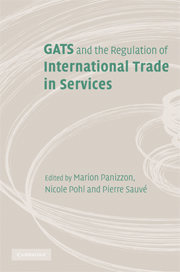Book contents
- Frontmatter
- Contents
- Contributors
- List of figures
- List of tables
- List of abbreviations
- Preface
- PART 1 Beyond regulatory control and multilateral flexibility: Gains from a cosmopolitan GATS
- PART 2 Unexplored economic, political and judicial dimensions of GATS
- PART 3 The limits of request–offer negotiations: Plurilateral and alternative approaches to services liberalisation
- 6 Services post-Hong Kong – initial experiences with plurilaterals
- 7 Negotiating approaches from a Member's perspective
- 8 Evaluating alternative approaches to GATS negotiations: Sectoral, formulae and others
- 9 Trade liberalisation under the GATS: An odyssey?
- PART 4 GATS case law: A first assessment
- PART 5 Market access, national treatment and domestic regulation
- PART 6 Unfinished business: Safeguard and subsidy disciplines for services
- PART 7 Challenges to the scope of GATS and cosmopolitan governance in services trade
- PART 8 Conclusion
- Index
- References
6 - Services post-Hong Kong – initial experiences with plurilaterals
from PART 3 - The limits of request–offer negotiations: Plurilateral and alternative approaches to services liberalisation
Published online by Cambridge University Press: 03 September 2009
- Frontmatter
- Contents
- Contributors
- List of figures
- List of tables
- List of abbreviations
- Preface
- PART 1 Beyond regulatory control and multilateral flexibility: Gains from a cosmopolitan GATS
- PART 2 Unexplored economic, political and judicial dimensions of GATS
- PART 3 The limits of request–offer negotiations: Plurilateral and alternative approaches to services liberalisation
- 6 Services post-Hong Kong – initial experiences with plurilaterals
- 7 Negotiating approaches from a Member's perspective
- 8 Evaluating alternative approaches to GATS negotiations: Sectoral, formulae and others
- 9 Trade liberalisation under the GATS: An odyssey?
- PART 4 GATS case law: A first assessment
- PART 5 Market access, national treatment and domestic regulation
- PART 6 Unfinished business: Safeguard and subsidy disciplines for services
- PART 7 Challenges to the scope of GATS and cosmopolitan governance in services trade
- PART 8 Conclusion
- Index
- References
Summary
Introduction
During the first half of 2006 WTO Members held three rounds of plurilateral negotiations on services based on more than twenty plurilateral requests. Despite some talk about refocusing on bilaterals, the process has been considered useful for shedding light on technical issues and on specific negotiating positions, outlining the contours of what could be a possible package in the Doha Work Programme's (DWP) services area. In the words of Ambassador Fernando de Mateo, Chair of the Council for Trade in Services, Special Session (CTS-SS), ‘[t]he level of engagement in the plurilateral negotiations has been better than expected… The overall assessment was that the meetings were useful… [the process of] preparing and discussing collective requests has been positive.’
This chapter discusses the DWP's plurilateral services negotiations. It first looks at the Hong Kong (HK) Ministerial text on plurilaterals; secondly, it discusses the origins of services plurilaterals, including the broader context of benchmarking and the so-called failure of bilateral negotiating methods; thirdly, the paper looks at initial experiences and patterns emerging in three rounds of plurilateral meetings. The paper concludes by asking whether plurilaterals met the expectations and objectives envisaged.
The Hong Kong language on plurilaterals
WTO Members conducted plurilateral negotiations according to the HK Ministerial Declaration. Annex C of the HK text sets forth various methods for negotiating specific commitments. Before HK, no other Ministerial Declaration had resulted in a ‘services text’ with a comparable level of detail.
- Type
- Chapter
- Information
- GATS and the Regulation of International Trade in ServicesWorld Trade Forum, pp. 145 - 171Publisher: Cambridge University PressPrint publication year: 2008
References
- 2
- Cited by



